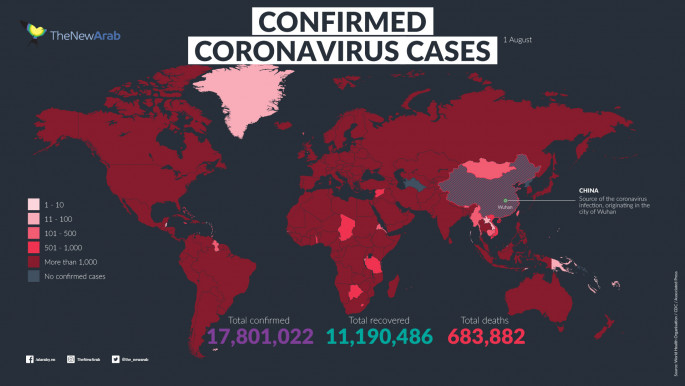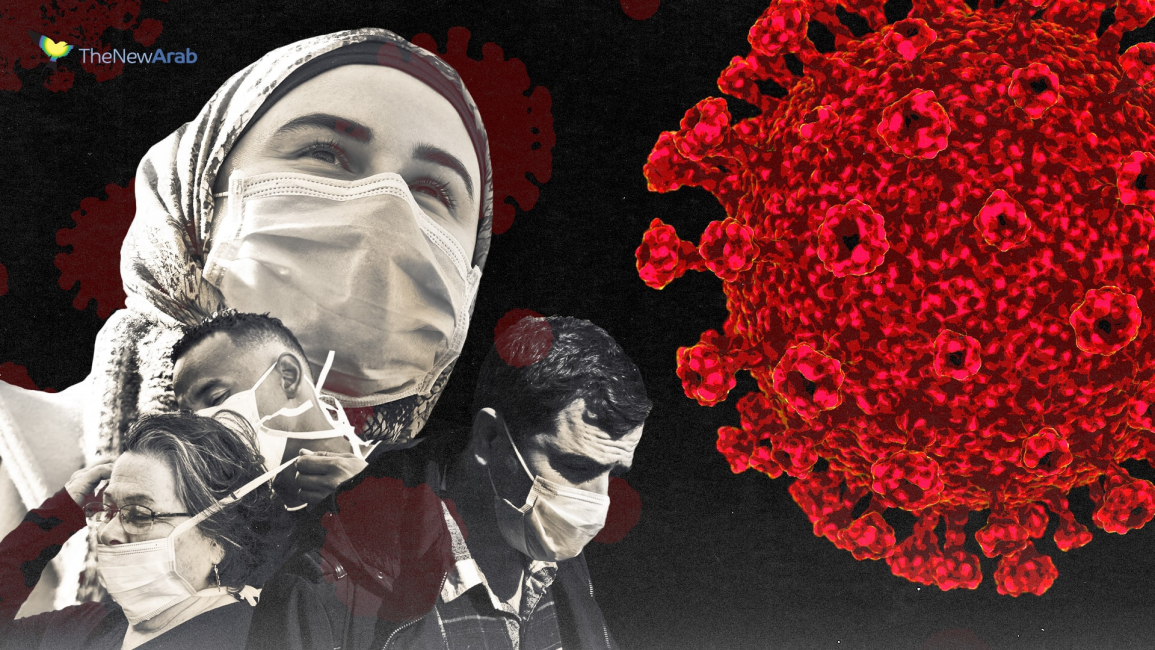The Middle East at war with coronavirus: Top stories from 8 July
Five stories you need to know about the coronavirus pandemic and how it is affecting the Middle East on 8 July.
1. Lebanese businessman convicted of financing Hezbollah in the US granted early release
Lebanese businessman Kassim Tajideen was released early from US jail as a coronavirus precaution during his five-year sentence for providing millions of dollars to the militant Hezbollah group.
Tajideen landed on Beirut on Wednesday, pictured stepping out of a small jet wearing a face mask. The video shows a man rushing toward Tajideen, hugging him and stooping down to Tajideen's feet in celebration of his release.
The businessman was sentenced last year in a federal court in Washington for his role in a money laundering conspiracy aimed at evading US sanctions.
He was arrested in Morocco and extradited to the US in 2017, where he was charged with laundering money for Hezbollah.
A Washington federal judge had ordered the release of Tajideen in May.
Read more here
2. Iran's coronavirus death toll exeeds 12,000
Iran said on Wednesday that its deaths from the novel coronavirus had surpassed 12,000, with authorities considering reimposing restrictive measures as soon as Saturday to contain a resurgence of the disease.
It came a day after the Islamic republic reported its highest single-day fatality count of 200 from the Covid-19 illness.
Health ministry spokeswoman Sima Sadat Lari said that another 153 deaths had been recorded over the past 24 hours, bringing the total to 12,084.
She said total cases had risen to 248,379 with 2,691 more people testing positive.
Nine of Iran's 31 provinces are now classified as "red", the highest category in the country's virus risk scaling.
Some red provinces have already reimposed restrictions in recent weeks after receiving a green light from the government.
Read more here
3. Palestinians extend West Bank lockdown
The Palestinian Authority announced it was prolonging a lockdown in the occupied West Bank for five days following a spike in coronavirus infections.
The lockdown, which began on Friday, will be extended until Sunday evening, Palestinian government spokesman Ibrahim Melhem said on Tuesday.
More than 4,570 people have tested positive for Covid-19 since the illness was first recorded in the West Bank and 17 have died, according to the Palestinian health ministry.
A week ago those figures stood at 2,356 cases and five deaths.
The Palestinian Authority imposed a full West Bank lockdown after the first coronavirus cases were identified in early March, lifting it at the end of May.
Read more here
 |
| Click to enlarge |
4. UN warns Yemen on the brink of famine again
War-torn Yemen is once again on the brink of famine as donor funds that averted catastrophe just 18 months ago have dried up, the country's UN humanitarian coordinator has said.
With much of the country dependent on aid, a coronavirus pandemic raging unchecked, and countless children already facing starvation, Lise Grande said that millions of vulnerable families could quickly move from "being able to hold on to being in free fall."
The United Nations raised only around half the required $2.41 billion in aid for Yemen at a June donor conference co-hosted by Saudi Arabia, which leads a military coalition backing the internationally recognised government against Houthi rebels who control much of the north.
Yemen is already gripped by what the UN calls the world's worst humanitarian crisis, with tens of thousands killed, an estimated four million people displaced by war and 80 percent of the country's 29 million people dependent on aid for their survival.
Grande said in an AFP interview from Sanaa that critical programmes providing sanitation, healthcare and food were already closing down because of a lack of cash, just as the economic situation is looking "scarily similar" to the darkest days of the crisis.
A critical fuel shortage, for which the Houthis and the government are trading blame, is now threatening the operation of the electricity grid, water supply, and key infrastructure like hospitals.
Read more here
5. In-depth: Death or jail: Egypt's medics battle Covid-19 and state persecution
Egyptian healthcare workers find themselves in a precarious position, with many forced to choose between risking their lives in the fight against Covid-19 and being arrested for voicing safety concerns or criticising the government's handling of the public health crisis.
Since the Covid-19 pandemic hit Egypt, a number of medical personnel have complained about unsafe working conditions, shortages of protective equipment, insufficient infection control training, limited testing of health staff, scarcity of hospital beds and the lack of access to essential healthcare.
They have also lamented the resulting deaths of frontline healthcare workers, which has led to a rare public confrontation between the Egyptian government and the country's medical community over how the state is managing the crisis.
"Anger is growing among doctors and the Ministry of Health is required to protect them," Mona Mina, former deputy head of Egypt's Doctors' Union, said in a public Facebook post in May. "You can't put soldiers on the battlefield without weapons".
So far, at least 117 doctors, 39 nurses and 32 pharmacists have died from Covid-19, and more than 3,000 are infected with the virus, according to statistics compiled by members of Egypt's Doctors' Syndicate.
Read more here
Follow us on Facebook, Twitter and Instagram to stay connected



